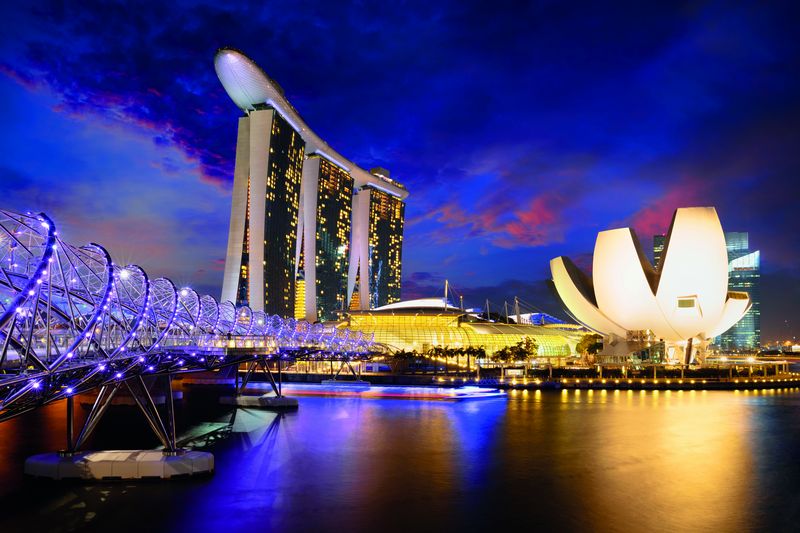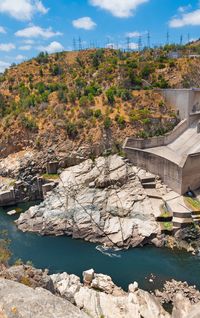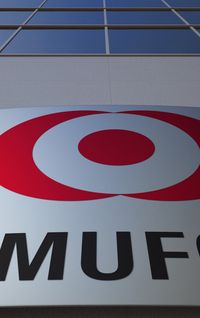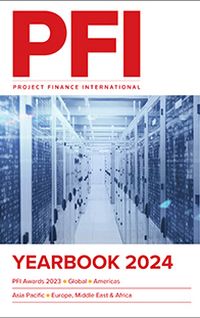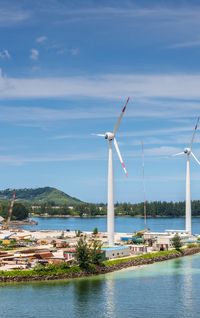Bank of the Year – SMBC
The year 2023 has been a busy one and among the many busy PF banks, one that stands out as arranger, lender and adviser in the PF sector is Sumitomo Mitsui Banking Corp (SMBC), PFI Asia-Pacific Bank of the Year.
The bank has been regularly making a dent in the league tables, and it is no different this year. As of end of September, it ranked second, just below State Bank of India, in the league table for arrangers.
The bank’s presence has been palpable, conspicuously visible as it has taken active roles in many of the landmark transactions this year in Asia-Pacific, not just in Japan and the ASEAN countries, but also in Australia and India, and in various industries.
SMBC acted as the hedge arranger and green loan coordinator for the massive loan for the Hai Long offshore wind scheme in Taiwan; the ECA coordinator for the RDMP Balikpapan scheme in Indonesia; sole hedge arranger offshore account and security bank, and global facilities agent for the Monsoon Wind project in Laos. SMBC was also the documentation and account bank for a financing for Keppel Corp, which is developing a gas-fired power plant designed to be 30% hydrogen-ready, and was sustainability agent in a data centre project in Hong Kong.
The bank was involved too as green loan coordinator in the Squadron Energy acquisition of CWP, and in the Perdaman Chemicals & Fertilisers deal, one of the biggest ammonia/urea transactions in Australia, and in the Adani Green Energy funding of a huge solar project in Gujarat, India.
SMBC does not just lend but also advises. In Australia, it has a number of advisory mandates on interesting projects that include the Maryvale waste-to-energy scheme in Victoria, the Central Queensland hydrogen project, and the Silver City advanced compressed air energy storage project. One current advisory mandate is the Bulacan airport in the Philippines, which may hit the market in the second half of next year.
The region’s project finance team, which is based in Singapore, is headed by Luca Tonello and Tomofumi Watanabe. They are supported by Jeanne Soh (renewables and sustainable energy) and Seth Tan (infrastructure and development finance) as well as Siddhartha Shrivastava (new energy and resources). India is covered by Rakhi Anand, who is also based in Singapore and reports to Soh. There are plans to expand the India team as the bank is committed to India’s long-term growth prospects. In Australia, the market is covered by Tarek El Rakshy who is supported by Jean-Marie Verrier (renewables and sustainable energy) and Jeremy Hasnip (energy transition).
Wind Deal of the Year – Monsoon Wind
Laos is known to be the battery of Asia, an exporter of power, delivering largely hydropower to Thailand. Monsoon Wind Power, however, is different. The 600MW wind project is the first wind power project in Laos and the largest onshore wind scheme in South-East Asia. It is the first cross-border wind power project in the region, delivering the much needed capacity to Vietnam’s EVN, the offtaker, under a 25-year PPA. It is the PFI Asia Pacific Wind Deal of the Year.
The project is sponsored by a group of six companies, which itself makes negotiations not an easy task. The sponsors are BCPG, which is a subsidiary of Bangchak Corp and holds a 40% stake in the project; Impact Electrons Siam (IES), Mitsubishi Corp, ACEN Renewables International, STP&I pcl, and SMP Group. Blended financing has become a key phrase these days, and indeed, the use of concessional blended finance in this project was critical in overcoming the project’s bankability issues that concerned commercial capital. A US$60m blended finance package was structured and provided to create an additional cashflow buffer and cash reserve that can endure extreme curtailment for more than three years without triggering default. In addition, the blended finance tranche has a longer tenor than the senior lender’s tranche, concessional pricing and some subordination structure.
Indeed, the Monsoon Wind debt package presents a collaboration between public financial institutions and commercial lenders. The project cost is US$950m and total debt raised was US$670m with tenors ranging from 17 to 19 years. Debt financing agreements were signed in March 2023 and construction is ongoing, with COD targeted for the end of 2025.
Leading the group of lenders was Asian Development Bank, the mandated lead arranger and bookrunner. It was joined by public financial institutions – Asian Infrastructure Investment Bank, Japan International Cooperation Agency, Hong Kong Mortgage Corporation, and Export-Import Bank of Thailand. Commercial financial institutions supporting the deal were KasikornBank, Siam Commercial Bank and SMBC. Milbank was the legal adviser to the lenders while Hunton & Williams was adviser to the sponsors and borrower.
The project is expected to reduce carbon emissions by 748,867 tonnes per annum in the country, and deliver 1,519 GWh of clean and affordable electricity per annum to meet Vietnam’s rapidly growing energy demand. The project will also be able to improve connectivity in the Greater Mekong Subregion (GMS) through cross-border infrastructure and supports Lao’s strategy to transform the country from a landlocked into a land-linked nation, which is considered a Least Developed Country.
Offshore Wind Deal of the Year – Hai Long
The offshore wind industry has been volatile this year with some developers expensively dropping out of projects and one Taiwanese scheme had to restructure its debt that included a huge new injection of capital. To be able to conclude and raise one of the biggest PF debt packages for an offshore wind project in Taiwan, amid such an erratic and challenging market environment that includes rising interest rates and rising construction costs, is remarkable and noteworthy. It demonstrated the commitment of the sponsors – Northland Power and Mitsui & Co, to the successful delivery of the project, transitioning from development to construction and soon into commissioning by 2026, while conducting the debt financing process at the same time. The Hai Long facility is the PFI Asia Pacific Offshore Wind Deal of the Year.
The project is Northland’s first offshore wind project in Asia and the fifth in its offshore wind portfolio, and it is Mitsui’s largest offshore wind project to date. The 20-year NT$117bn (US$3.6bn) loan package for the Hai Long offshore wind project is the PFI AP Offshore Wind Deal of the year.
The project involves two project companies: Hai Long 2 Offshore Wind Power Co for the 294MW Hai Long 2A wind farm, which has a 20-year PPA with Taipower; and Hai Long 3 Offshore Wind Power Co for the 744MW Hai Long 2B and 3 wind farms, which have a 30-year corporate PPA, making it the first Asian offshore wind project to have a revenue profile dominated by corporate PPAs.
The NT dollar lenders are ANZ, Credit Agricole, Deutsche Bank, DBS, HSBC, Mizuho, MUFG, Standard Chartered, SMBC, CTBC, Fubon Bank, Fubon Life and Taiwan Life Insurance. The euro lenders are KDB and Shinsei Bank. Japan Bank for International Cooperation (JBIC) provided a yen loan. Support from the ECA group was a key factor in the financing as well. It had seven ECAs from six different countries in four continents: Export Development Canada (EDC), JBIC, Nippon Export and Investment Insurance (NEXI), UK Export Finance (UKEF), Export Finance Norway (Eksfin), Belgium’s Credendo, and Export Finance Australia (EFA). The sponsors had MUFG as financial adviser and Linklaters and Tsar & Tsai as legal adviser. The lenders had Clifford Chance and Lee and Li as their counsel.
Petchem Deal of the Year – Balikpapan
Indonesia has long been wanting to redevelop, and improve and expand its refineries under the Refinery Development Master Plan (RDMP) outlined in 2015 to meet growing demand. The first upgrade is with the Balikpapan Refinery, which is managed by project company Kilang Pertamina Balikpapan (KPB), a subsidiary of Kilang Pertamina Internasional (KPI), itself a processing and petrochemical subholding of Pertamina. Project sponsors are KPB, KPI, and Pertamina.
The project has been designated as a national strategic project and will play a crucial role in enhancing Indonesia’s national energy resilience. The upgrade includes a design to enable the refinery to produce other high-value products such as propylene, and includes the introduction of more advanced technology and processes to produce cleaner and higher-quality Euro 5 standard fuels, making it PFI Asia Pacific Petchem Deal of the Year.
The RDMP initiative will increase Balikpapan’s capacity from about 260,000bpd to 360,000bpd, helping to meet rising domestic demand for fuel and petrochemical products. The EPC contractor is a consortium comprising SK Engineering & Construction, Hyundai Engineering, Rekayasa Industri, and Pembangunan Perumahan. Once completed, the Balikpapan RDMP project will be more environmentally friendly and its emissions reduced, thereby supporting the government’s net-zero emission programme. The whole upgrade, called RDMP Balikpapan, is estimated to require US$7.24bn of investment and of this KPB raised a massive 14-year US$3.1bn PF loan, which attracted three ECAs and an impressive 22 commercial lenders. The ECAs are Export-Import Bank of Korea, Korea Trade Insurance Corporation, and Italy’s SACE.
The long list of commercial lenders includes domestic institutions – Bank Mandiri, Bank Rakyat Indonesia, and Sarana Multi Infrastruktur – and international lenders – Bank of China, Credit Agricole, Deutsche Bank, DZ Bank, HSBC, KEB Hana, Maybank, Mizuho, MUFG, National Bank of Kuwait, OCBC, Santander, Shinhan Bank, Societe Generale, SMBC, Standard Chartered and UOB. The lenders had Allen & Overy as legal counsel while the borrower and sponsors had White & Case.
The facility is seen as a milestone transaction for Indonesia as it is the largest financing transaction in the country in recent years. It also uses a trustee borrower structure created under a trust agreement and supported by a sponsor agreement with KPB to manage the project-level commitments. It also enjoys contractual support from Pertamina that effectively back-stops the entire financing.
Acquisition Deal of the Year – CWP Renewables
Squadron Energy’s acquisition of Australian developer CWP Renewables was the largest M&A deal in Australia’s renewable energy sector to date at A$4.2bn and banks on this deal demonstrated an advanced level of flexibility to facilitate the swift construction of new assets as part of a portfolio. The deal marked an immense and rapid escalation of Squadron’s ambitions in the sector, such that it now has a claim as the largest Australian renewable energy investor, operator and developer with a 2.4GW operating portfolio in renewables and a 20GW portfolio including early-stage projects. The CWP Renewables purchase is PFI’s APAC Acquisition Deal of the Year 2023.
Squadron Energy was able to keep a low profile as a bidder during the highly competitive auction hosted by seller Partners Group, by utilising the stapled financing put together by sell-side advisers Macquarie Capital and Clifford Chance to encourage bidder participation. Other bidders brought their own debt. The stapled financing was on very competitive terms, compared with other bids. Squadron Energy is owned by Australian billionaire Andrew Forrest’s family investment company Tattarang.
A syndicate of 11 banks provided a A$2.05bn borrowing including a five-year term loan. Lenders are Agricultural Bank of China, Bank of China, CBA, HSBC, ICBC, ING, MUFG, NAB, SMBC, Societe Generale and Westpac. Pricing was around 150bp above BBSY. The debt provides an open platform portfolio financing offering the borrower flexibility to bring in and take out projects based on portfolio testing. The structure enabled the borrower to negotiate terms on a portfolio basis, including financial ratios tested across the portfolio, portfolio-based offtake review events, and flexible project account mechanics, which allow portfolio entities to manage their own cashflows. This type of structure has blazed a trail for platform financing other operational and development platforms, as part of M&A deals or portfolio refinancings.
At the time of purchase, CWP Renewables had 1.1GW of operational capacity. Already, post-acquisition Squadron has utilised the portfolio loan for the Uungula wind farm in New South Wales, a 414MW project that was construction-ready at the time of the acquisition. The 30MW Sapphire Battery is construction-ready, while approvals are in place for four more wind farms in NSW totalling 750MW, a 180MW solar farm, two battery projects and the 64MW Dubbo firming power station that could run on hydrogen, hydrogen gas blends and biofuels.
Allens was legal counsel for the lenders. Squadron Energy’s advisers were Highbury Partnership, Skye Capital Advisory and Clayton Utz.
Industrial Deal of the Year – Perdaman
Family-owned private multinational Perdaman spent more than 15 years in the development phase of the Karratha Urea Project in Western Australia, Australia’s first facility producing nitrogen-based fertiliser urea. The US$4.18bn project is set to be one of the largest producers of urea in the world and also holds the record as Australia’s largest ever downstream manufacturing project and its largest fertiliser project. The Perdaman Karratha urea project is PFI’s APAC Industrial Deal of the Year 2023.
Perdaman Chemicals & Fertilisers brought in US infrastructure fund manager Global Infrastructure Partners as an equity investor in the project, for total equity of US$1.7bn. In April, project company Perdaman Chemicals & Fertilisers Finance closed on a US$2.475bn hard mini-perm term loan with a seven-year tenor, with additional EPC performance bond debt and an equity letter of credit. The senior secured non-recourse loan was provided by BNP Paribas, Commonwealth Bank of Australia, HSBC, ICBC, Intesa Sanpaolo, MUFG Bank, National Australia Bank, Banco Santander, Société Générale, Sumitomo Mitsui Banking Corporation, Standard Chartered Bank and Westpac, as well as the federal government lenders Northern Australia Infrastructure Facility and Export Finance Australia.
The project has boosted its sustainability credentials over its 15-year development. Initially, Perdaman planned to use coal as a feedstock but switched to natural gas. The plant will source gas from the under-construction Scarborough gas field off WA’s coast processed via Woodside’s and GIP’s Pluto LNG Train 2 near Karratha. The facility converts the gas to ammonia and then to urea. Banks say the plant’s emissions will be roughly 80% lower than existing coal-fed counterparts.
Perdaman has committed to making the urea plant net-zero emissions by 2050. Towards this target it has secured land on which it is planning a 100MW solar farm. Straight away it will be using seawater for cooling, and the latest efficiency technology from Topsoe and Snamprogetti & Thyssenkrupp.
The plant is expected to produce 2.3m tons per annum of urea, which Australia-based Incitec Pivot Fertilisers has contracted to purchase in full for 20 years from 2027. Australia-based project finance bankers for the first time had to assess the urea market and price forecasting, as the offtake contract is not fixed price. Incitec will supply farmers in Australia, APAC and the Americas, contributing to domestic and global food security. The project should take Australia from being a net importer to a net exporter of urea.
WeBuild’s subsidiary Clough and Saipem are joint engineering, procurement and construction contractors under a fixed-price lump sum contract. EY was Perdaman’s equity financial adviser and Societe Generale was debt financial adviser. White & Case was legal adviser to Perdaman and Allens was legal adviser to GIP. Ashurst was lenders’ legal counsel.
Digital Deal of the Year – AdaniConneX
Adani Group and EdgeConneX’s joint platform AdaniConneX has successfully raised India’s first US dollar project financing for funding two greenfield data centres with 67MW of capacity. In addition, the financing accommodates a variety of underlying user contracts for the data centres with contracted and uncontracted cashflows, serving as a pathfinder deal that could open up the possibility of project finance debt for a much broader range of data centre projects in the APAC region. The AdaniConneX data centres financing is PFI’s APAC Digital Infrastructure Deal of the Year 2023.
Indian conglomerate Adani Group and US-headquartered data centres operator EdgeConneX established AdaniConneX as a 50:50 joint venture in 2021 with a target to build 1GW of green data centre capacity within a decade. As of fiscal 2022, India had roughly 870MW of data centre capacity according to CRISIL estimates. Swedish fund manager EQT Infrastructure has owned EdgeConneX since 2020.
In June, AdaniConneX reached financial close on its first project financing, after around a year of structuring the deal. The debt is a US$213m seven-year non-recourse financing for the 50MW Noida campus data centre in Uttar Pradesh state and the 17MW Stage One Chennai Campus data centre in Tamil Nadu state. Lenders were ING Bank, Mizuho Bank, MUFG Bank, Natixis, Standard Chartered Bank and Sumitomo Mitsui Banking Corporation. The loan for two separate projects was raised under a framework agreement for platform infrastructure financing, setting groundwork for AdaniConneX’s future projects. AdaniConneX is planning a 300MW data centre in Vizag in Andhra Pradesh to be powered with 100% renewable energy.
Lenders on the transaction assessed the varying counterparty risk profiles and accommodated a combination of contracted and uncontracted cashflows for the two data centres. Google has contracted around 80% of the capacity in a hyperscale long-term 13-year contract, but it is complex as it features five-year rolling renewals and the capacity would be gradually rolled out on a build-to-suit basis up to 50MW, with debt drawdowns linked to capacity. Meanwhile, around 20% of the data centres’ cashflows would be from smaller co-location contracts with durations in the range of one to three years. These can be for as little capacity as 1MW in each contract.
Allen & Overy and Saraf & Partners were the borrower’s legal counsels. The lenders’ counsels were Clifford Chance and Cyril Amarchand Mangaldas.
Indian Deal of the Year – Serentica
Serentica Renewables is a newly established platform in the Indian market that has taken a new approach by targeting the commercial and industrial offtake market. In December, Serentica signed on its first international and commercial bank project finance ECB green loan for a 530MW round-the-clock wind and solar project in Rajasthan and Maharashtra. The transaction has brought a group of three international banks and three Indian lenders into the corporate offtake market in this country, while also providing a strong footing on the path to decarbonisation for one of India’s largest zinc producers operating in a hard-to-abate sector. The Serentica Renewables Round-the-Clock project is PFI’s Indian Deal of the Year 2023.
US private equity giant KKR and Indian billionaire Anil Agarwal’s investment company Twinstar Overseas established Serentica Renewables in 2022 to provide RTC baseload style energy to large-scale C&I customers in energy-intensive industries. The C&I segment consumes more than 50% of electricity generated in India. As of September, KKR had invested US$650m in the platform. Already it has an at least 1.2GW portfolio of projects and in the medium-term aims for 5GW. State-owned PFC and REC have funded earlier projects.
In December, Serentica signed a US$425m project finance loan to fund the US$566m 530MW wind and solar RTC project in Rajasthan and Maharashtra. Rabobank was lead bank on the structuring of an ECB loan in US dollars, which achieved a tenor of seven years. Rabobank and MUFG Bank were co-green loan coordinators. Lenders are Rabobank, MUFG Bank, Société Générale, YES Bank, Export-Import Bank of India, and India Infrastructure Finance Company.
The project has a 200MW 25-year power purchase agreement with Hindustan Zinc, which is owned by mining and metals company Vedanta, 64.9%, and the Indian government, 29.5%. The renewable energy will be used for powering one of Hindustan Zinc’s smelters, thus replacing 24% of the company’s coal-based power supply with renewable energy. The green energy PPA has a tariff almost half of the price the smelter has been paying for coal power. Hindustan Zinc has a roughly 80% market share for zinc production in India and is expected to continue to pursue green power initiatives for its operations.
Advisers to Serentica Renewables included Dentons and Deloitte. The lenders were advised by law firms Norton Rose Fulbright and Luthra & Luthra, while Tractebel was lenders’ engineer.
To see the digital version of this report, please click here.
To purchase printed copies or a PDF of this report, please email leonie.welss@lseg.com
